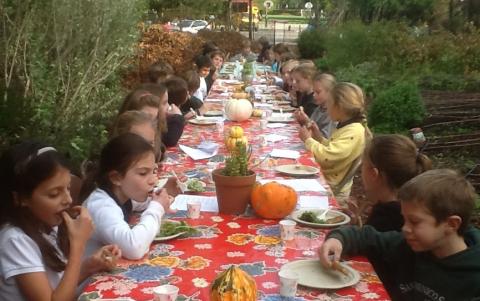
San Domenico School Garden of Hope
The Garden of Hope is a sacred place and learning center for San Domenico students and faculty, but has expanded to become a model for the greater community. Our sustainability program has been featured in articles in the Marin Independent Journal, Marin Magazine, Terra Magazine, Red Orbit, More Marin, and other magazines such as Fast Forward. It is known as a place to showcase how other school gardens, community organizations, and individuals can learn how to live more sustainably with the earth. Our garden has hosted conferences for both children and adults learning to create similar sustainable projects in their homes and schools.
The one acre garden of hope features growing space for vegetables, berries, and fruit trees. Our themed gardens include plants for butterfly and hummingbirds, pond habitat, and plants for making tea and herb spirals. The produce from our garden is used in student projects for crafts, canning, and cooking in our garden kitchen. What remains is brought to the dining hall for use in school lunches.
One of the many jewels in our one acre Garden of Hope is our outdoor kitchen, equipped with a cob pizza oven, charming work spaces, outdoor stove top, sink, and terracotta tile floor. The space was developed as an outdoor kitchen laboratory to engage students in hands-on projects that foster healthy relationships to food such as baking, canning, herb drying, iron chef cooking activities, designing, preparing, and sharing celebratory meals. The garden, which includes multiple seasonal beds, grapevines, raspberry and blackberry patches, fresh eggs from our chickens, and a myriad of herbs and edible flowers, is planted, tended, and harvested by all our students. We believe that by involving them in the entire cycle of their food from garden to table they gain a deeper understanding of the importance of seasonal, fresh food. It instills in them the importance of knowing where their food comes from and it links food and nutrition to the concept of sustainable agriculture. Many of our kitchen garden projects are integrated with studies in history, art, math, science, and religious studies.




